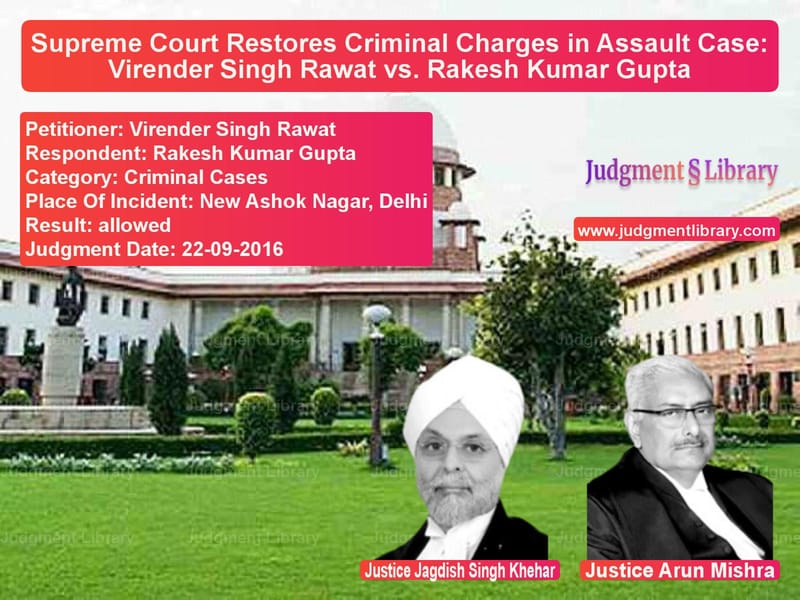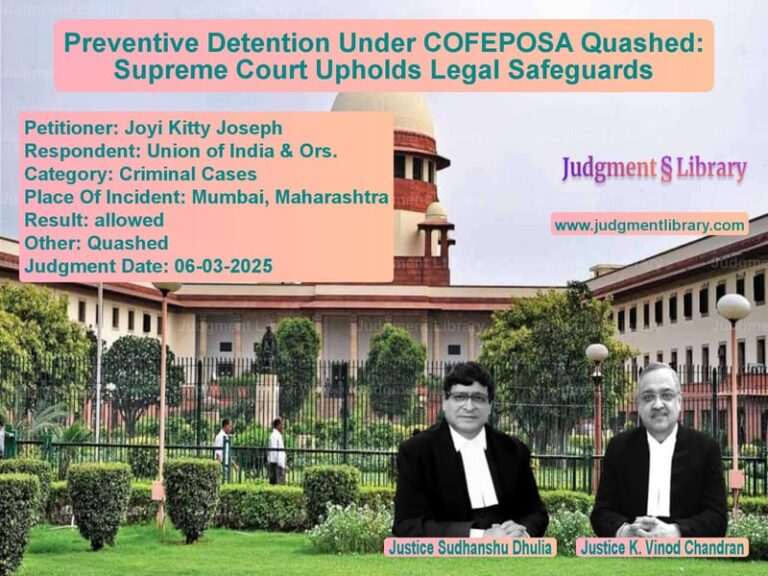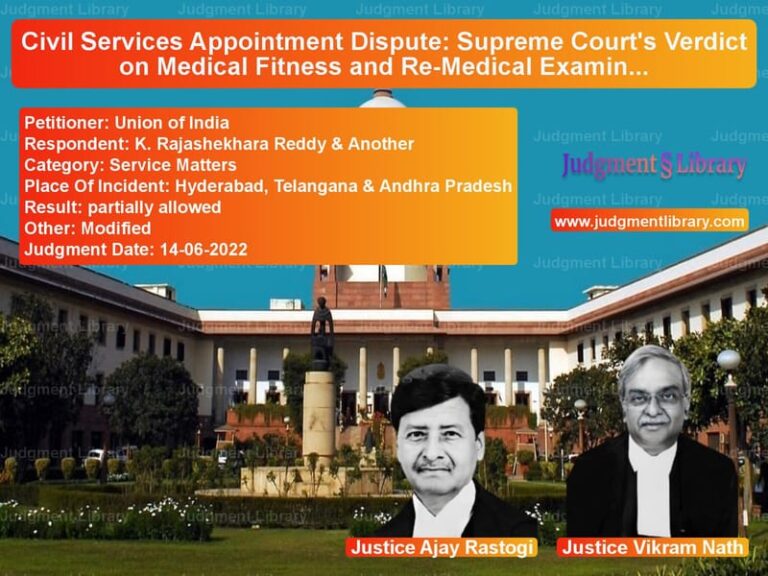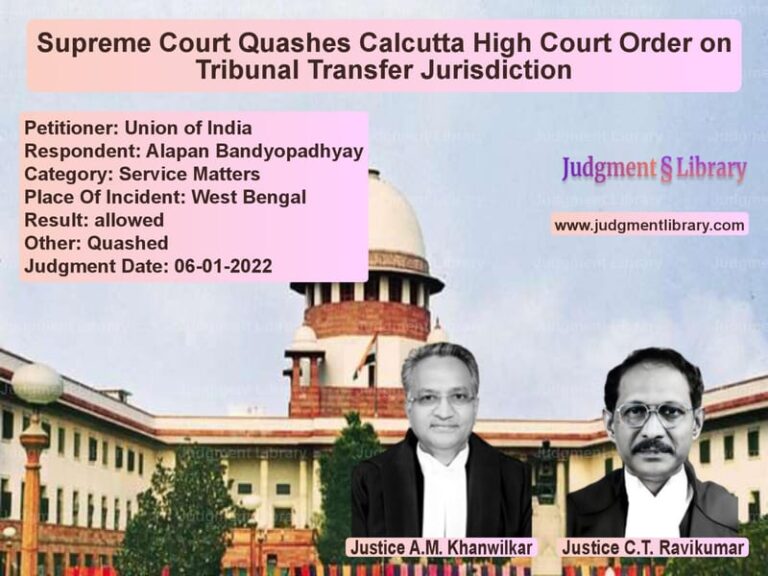Supreme Court Restores Criminal Charges in Assault Case: Virender Singh Rawat vs. Rakesh Kumar Gupta
The case of Virender Singh Rawat vs. Rakesh Kumar Gupta revolved around a criminal appeal challenging the High Court’s order that had set aside the charges against the accused. The Supreme Court was tasked with determining whether there was sufficient prima facie evidence to reinstate the charges against Rakesh Kumar Gupta in an assault and attempted murder case.
Background of the Case
The case stems from an incident that took place on February 13, 2003, at around 10:15 PM, at a shop located at A-690, New Ashok Nagar, Delhi. The complainant, Virender Singh, along with his brother, Balbir Singh, was running a shop at the location, which was owned by Mukesh Gupta. A dispute arose regarding vacating the premises, leading to a violent altercation.
According to the First Information Report (FIR) filed at 12:20 AM on February 14, 2003, Virender Singh named three individuals as being involved in the attack:
- Parmohan
- Mukesh Gupta
- Rakesh Kumar Gupta (respondent)
The FIR also mentioned that other unknown individuals were involved, though their identities were not immediately known.
High Court’s Ruling
The respondent, Rakesh Kumar Gupta, filed a petition before the High Court seeking to quash the charges against him. The High Court, in its order dated September 18, 2009, agreed with the respondent’s argument that his name was not originally mentioned in the FIR but was introduced later through supplementary statements.
The High Court based its decision on the following factors:
- The complainant, Virender Singh, first named Rakesh Kumar Gupta in a supplementary statement recorded on March 23, 2003, after allegedly seeing him in police custody.
- The court observed that if Virender Singh had truly identified Rakesh Kumar Gupta as one of the attackers, he would have mentioned his name in the initial FIR.
- The court concluded that no strong suspicion existed against the accused and set aside the charges.
Supreme Court’s Judgment
The Supreme Court, in a bench comprising Justice Jagdish Singh Khehar and Justice Arun Mishra, delivered its ruling on September 22, 2016. The key points from the judgment were:
Key Observations by the Supreme Court
- The Court noted that the name of Rakesh Kumar Gupta was mentioned in a fax message sent by a witness, Karan Singh, to the Commissioner of Police on the night of the incident.
- The fax message, sent at 11:25 PM on February 13, 2003, specifically named Rakesh Kumar Gupta as one of the assailants, even before the FIR was officially registered.
- In addition to the fax message, Virender Singh’s supplementary statements recorded on February 16, 2003, and March 23, 2003, further confirmed Gupta’s involvement.
- The Court held that the High Court made an error by setting aside the charges based on procedural discrepancies rather than evaluating the factual evidence.
- The Supreme Court ruled that whether or not the complainant knew Rakesh Kumar Gupta’s name at the time of the FIR was irrelevant since independent evidence linked him to the crime.
Final Ruling
- The Supreme Court set aside the High Court’s order and reinstated the charges against Rakesh Kumar Gupta.
- The trial court was directed to proceed with the case and frame charges against the respondent.
- The Supreme Court ordered that the trial be expedited, as the incident had occurred more than 13 years earlier.
- The respondent was barred from seeking relief based on delays in trial proceedings, as he had contributed to the delay.
Impact of the Judgment
- This ruling reinforces the principle that courts must consider all available evidence before quashing charges.
- It emphasizes that procedural lapses in FIRs should not be the sole basis for dismissing criminal charges, particularly when independent corroborative evidence exists.
- The judgment strengthens witness credibility in criminal cases, as it recognized the importance of timely disclosures made by eyewitnesses.
- The case sets a precedent for handling similar situations where an accused’s identity is revealed in supplementary statements rather than in the initial FIR.
Don’t miss out on the full details! Download the complete judgment in PDF format below and gain valuable insights instantly!
Download Judgment: Virender Singh Rawat vs Rakesh Kumar Gupta Supreme Court of India Judgment Dated 22-09-2016-1741883992414.pdf
Direct Downlaod Judgment: Direct downlaod this Judgment
See all petitions in Attempt to Murder Cases
See all petitions in Fraud and Forgery
See all petitions in Theft and Robbery Cases
See all petitions in Judgment by Jagdish Singh Khehar
See all petitions in Judgment by Arun Mishra
See all petitions in allowed
See all petitions in supreme court of India judgments September 2016
See all petitions in 2016 judgments
See all posts in Criminal Cases Category
See all allowed petitions in Criminal Cases Category
See all Dismissed petitions in Criminal Cases Category
See all partially allowed petitions in Criminal Cases Category







